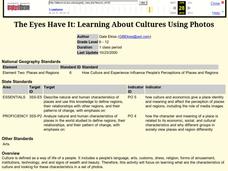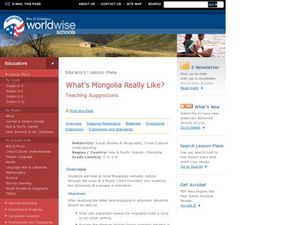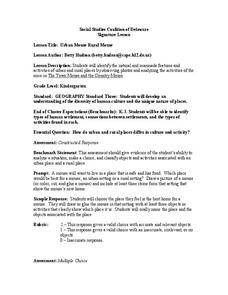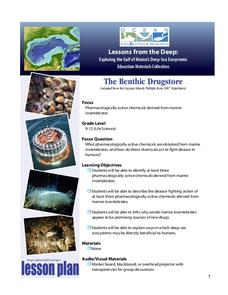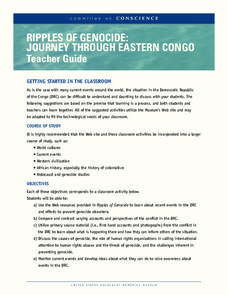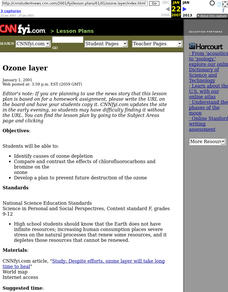Curated OER
The Eyes Have It: Learning About Cultures Using Photos
Young scholars focus on determining what the characteristics of culture are. They look for these characteristics in a set of photos. They complete a worksheet imbedded in this plan.
Curated OER
Wetland Metaphors
Learners describe the characteristics of wetlands and identify their ecological functions. They inspect items and use them to create metaphors about wetlands.
Peace Corps
What's Mongolia Really Like?
Understanding different cultural experiences is a challenging and worthwhile objective throughout grade and content levels. This lesson facilitates an appreciation of rural Mongolian life through a simulation of being a nomadic teen...
Curated OER
World War II - War Comes to Hawaii
Ninth graders use geographic representations to organize, analyze, and present information on people, places, and environments. They use tools and methods of geographers to construct, interpret, and evaluate qualitative and quantitative...
Curated OER
Wildlife Variety Show: Biodiversity In Illinois
Eighth graders write a short report in first person about any plant or animal found on a list of Illinois species. They become the character of the plant or animal and give a short report describing the plant or animal.
Curated OER
Confucianism: A Cornerstone
Studetns comprehend that confucianism is an important underlying philosophy permeating East Asian cultures. They also explore who Confucius was and what he taught, which helps them gain insight into East Asian cultures. Students...
Curated OER
What's Mongolia Really Like?
Students discover the people of Mongolia. In this social studies lesson plan, students look at the Mongolian nomadic culture by reading a letter written by a member of the Peace Corps. They describe the different types of communities...
Wild BC
Is Climate Change Good for Us?
Is it really that big of a deal if the global climate undergoes a little change? Young environmentalists consider this very question as they discuss in small groups the impact of different climate change scenarios on their lives,...
Social Studies Coalition of Delaware
Urban Mouse Rural Mouse
Explore rural and urban environments over the course of four days. Each day offers a new look into how both environment compare and contrast. Activities include the observation and analyzation of images, a read aloud and grand discussion...
Earth Day Network
Filtering Water
See the water filtration system up close with a fun science experiment. Young scientists work for several class periods to design a water filter using household objects, and then decide which filter material would be most effective...
NASA
Unsung Heroes of Science
Scholars research scientific heroes who haven't been given enough credit for their discoveries. While many are women, there are also men to whom credit is overdue.
Advocates for Human Rights
A Global Perspective on Immigration
To gain a global perspective on immigration, groups investigate and create a map of the migration patterns in Africa, Asia, Europe, Latin America, and the Middle East. Class members then examine the background, immigration history, and...
Syracuse University
Ancient World Writing System
Most twenty-first century pupils don't know how to interpret cuneiform. Examining images of cuneiform and papyrus writing and using a chart and Venn diagram, young historians extrapolate what life may have been like for people who lived...
Curated OER
Assessing Risks for Inhalation and Ingestion of Pollutants
Young scholars use a hypothetical scenario to investigate inhalation of an airborne pollutant and ingestion of a waterborne pollutant. They work in pairs, investigating differences in overall exposure to contaminants by calculating...
Sea World
Endangered Species
Study different endangered species with several activities that incorporate math, science, language arts, and research strategies. A great addition to your activity on conservation or Earth Day.
National WWII Museum
A New War Weapon to Save Lives
Young historians view and analyze photos and documents from WWII that are related to blood transfusions and blood plasma. A demonstration of correct and incorrect blood donors visually shows the importance of knowing blood...
NOAA
Technology II
Ping, ping, ping. The last installment of a 23-part NOAA Enrichment in Marine sciences and Oceanography (NEMO) program explores technology use in marine studies, such as sonar. Activity involves simulating sonar techniques to identify a...
NOAA
Ocean Layers I
How is it possible for ocean water to have layers? The sixth installment of a 23-part NOAA Enrichment in Marine sciences and Oceanography (NEMO) program investigates factors that cause different water densities to occur. Experiments...
NOAA
Importance of Deep-Sea Ecosystems – The Benthic Drugstore
You never know what you will find next in the deep sea ecosystem. So far, scientists have found items that work as anti-tumor agents, anti-inflammatory agents, agents that stop uncontrolled cell division, and much more. The lesson begins...
US Holocaust Museum
Ripples of Genocide: Journey through Eastern Congo
Could you locate the Democratic Republic of Congo on a map? Scholars investigate the genocide taking place in Eastern Congo. Groups explore web-based evidence as well as the Ripples in Genocide source to take a closer look at the issue....
Curated OER
Ozone Layer
Students read a CNNfyi.com article in order to identify causes of ozone depletion. They compare and contrast the effects of chlorofluorocarbons and bromine on the ozone. They develop a plan to prevent future destruction of the ozone.
Curated OER
Kosovo: A Thousand Year Old Border Conflict
Students present proposals and negotiate with other representatives to bring lasting peace to the area through a simulated "Summit Conference."
Incredible Art Department
Notan Collages - "Expanding the Square"
Notan is a Japanese word that expresses the interaction between light and dark. Learners explore Notan while creating dimensional art pieces that examine positive and negative spaces. They'll discuss the art of Notan, create...
Curated OER
Jazz In America
Students gain a fundamental understanding of the role of jazz in the Harlem Renaissance. They explain its historical significance and cultural implications.
